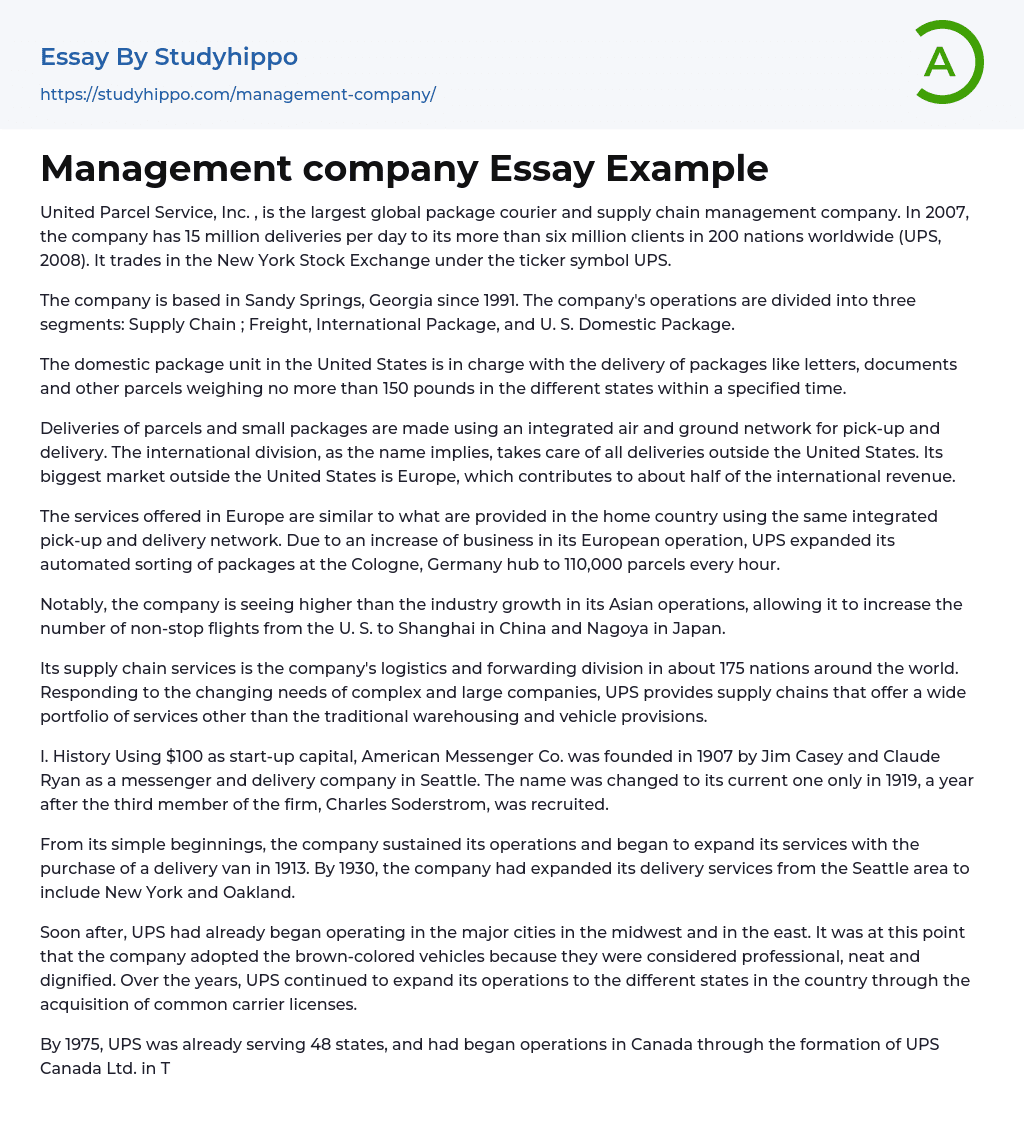The largest global package courier and supply chain management company is United Parcel Service, Inc. (UPS). As of 2008, UPS had 15 million deliveries per day to its over six million clients in 200 countries worldwide. UPS trades on the New York Stock Exchange under the symbol UPS and is based in Sandy Springs, Georgia since 1991. UPS's operations are divided into three segments: Supply Chain, Freight, International Package, and U.S. Domestic Package.
The domestic package unit of UPS in the United States delivers packages such as letters, documents, and parcels weighing up to 150 pounds within a specified time frame through an integrated air and ground network. The international division is responsible for all deliveries outside the United States, with its biggest market being Europe which generates about half of its international revenue. UPS offers similar services in
...Europe compared to the United States, utilizing the same integrated pick-up and delivery network. As business expanded in its European operation, UPS increased its automated sorting of packages at the Cologne, Germany hub to 110,000 parcels per hour.UPS is experiencing growth in its Asian operations, allowing it to increase non-stop flights from the U.S. to Shanghai and Nagoya. The company's logistics and forwarding division operates in about 175 nations worldwide, providing supply chains tailored to the needs of complex and large companies with a range of services beyond traditional warehousing and vehicle provisions. Founded in 1907 as American Messenger Co. with just $100, UPS began as a Seattle-based messenger and delivery company. In 1930, UPS expanded its services from Seattle to New York and Oakland, and soon after began operating in major cities across the Midwest an
East Coast. The company adopted its signature brown vehicles for their professional, neat, and dignified appearance. As UPS continued to expand, it acquired common carrier licenses and expanded operations to different states.
UPS expanded its operations to Canada in 1975 with the formation of UPS Canada Ltd. in Toronto, after having already served 48 states. In 1976, the company used the Blue Label Air to expand to Europe. To increase efficiency and cost savings, UPS Airlines was launched in 1988. The company went public on November 10, 1999, and continued its expansion around the world, acquiring Menlo Worldwide Forwarding as its entry-point to heavy freight in 2004 and Overnite Transportation in a billion-dollar transaction. The most recent acquisition was LYNX Express in the UK. On August 28, 2007, UPS celebrated its 100th year in business.
Currently, D. Scott Davis serves as CEO and Chairman of the Board for UPS. David P. Abney is the President, Chief Operating Officer, and Senior Vice President of UPS Airlines. Other members of senior management include David A. Barnes as Senior VP and Chief Information Officer and Daniel J. Brutto as Senior VP and President of UPS International. The company's philosophy is to maintain industry leadership through integrity in handling transactions.
As the company grows and expands into other markets, its main focus remains on doing the right thing. This means pursuing its goals ethically, without resorting to shady transactions or violating laws to gain a competitive advantage over others. UPS believes in conducting business with integrity and responsibility, as stated in its mission statement. Its value system is paired with a program that provides the right environment for
good decisions to be made by good people. The Corporate Compliance Committee, headed by an officer and management members, oversees the promotion, implementation, and maintenance of this value system. The compliance department also develops and audits the programs in place. UPS recognizes that its commitment to ethical decisions is what has helped it grow and will sustain its leadership and growth in the future. The organization has a distinctive culture that values its employees. Since 1927, employees have been given ownership of stock, recognizing that success comes from putting value in its workforce (U.S. SEC, 2008).
- Chief Executive Officer essays
- Convenience Store essays
- Firm essays
- Training And Development essays
- Unilever essays
- Variable Cost essays
- Virgin Group essays
- Bargaining essays
- Entity essays
- Pest analysis essays
- Bankruptcy essays
- Earnings essays
- Tata Group essays
- S corporation essays
- Secretary essays
- Premise essays
- John Locke essays
- 9/11 essays
- A Good Teacher essays
- A Healthy Diet essays
- A Modest Proposal essays
- A&P essays
- Academic Achievement essays
- Achievement essays
- Achieving goals essays
- Admission essays
- Advantages And Disadvantages Of Internet essays
- Alcoholic drinks essays
- Ammonia essays
- Analytical essays
- Ancient Olympic Games essays
- APA essays
- Arabian Peninsula essays
- Argument essays
- Argumentative essays
- Art essays
- Atlantic Ocean essays
- Auto-ethnography essays
- Autobiography essays
- Ballad essays
- Batman essays
- Binge Eating essays
- Black Power Movement essays
- Blogger essays
- Body Mass Index essays
- Book I Want a Wife essays
- Boycott essays
- Breastfeeding essays
- Bulimia Nervosa essays
- Business essays




